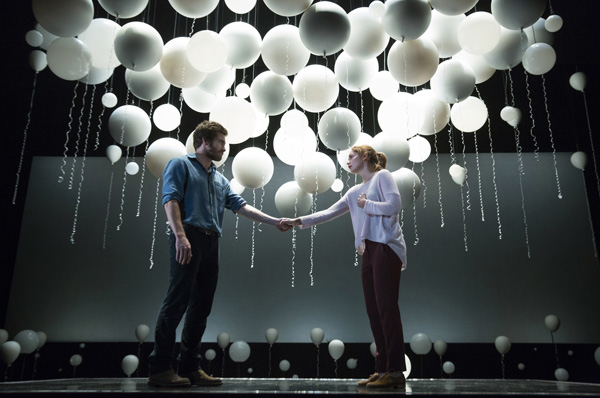Constellations
Can you give spoilers in a review of a play about the multiverse, where literally all outcomes are possible?

(© Joan Marcus)
Who knew theoretical physics could be so sexy? That's one of the thoughts that flashed across my mind while viewing Nick Payne's Constellations, now making its American premiere at Broadway's Samuel J. Friedman Theatre in a production by Manhattan Theatre Club. Of course, anything with Jake Gyllenhaal is bound to be a little sexy. In 2012, the Hollywood hunk appeared off-Broadway in Payne's If There Is I Haven't Found It Yet. Now he's making his Broadway debut opposite Ruth Wilson (newly minted Golden Globe winner for Showtime's The Affair). While their performances are moving and the subject fascinating, Constellations feels oddly unsatisfying. This may very well be the result of Payne's novel but underdeveloped approach.
A hit in London, Constellations is the story of beekeeper Roland (Gyllenhaal) and theoretical physicist Marianne (Ruth Wilson). The opening scene shows their first encounter, in which Marianne approaches Roland with a unique pickup line: "Do you know why it's impossible to lick the tips of your elbows?" Roland rebuffs her and that seems to be the end of it. Then suddenly, the lights shift and they're playing the scene again, but in a slightly different way. Have we stepped into the movie Groundhog Day? No, it turns out we've just entered the multiverse: the hypothetical collection of infinite alternate universes existing alongside the one we perceive as reality. Marianne explains it all during a drunken primer on general relativity, quantum mechanics, and the various string theories that connect them. Feeling hot?
Don’t worry, you will. Gyllenhaal and Wilson have a natural and idiosyncratic chemistry that feels believable. We never question the authenticity of their relationship as they hop from one universe to the next depicting courtship, infidelity, illness, joy, and heartbreak. There are just so many ways Marianne and Roland could go right, and terribly wrong. Under the steady and efficient direction of Michael Longhurst, Wilson and Gyllenhaal portray them all with commitment and gusto.
These competing scenarios play out on Tom Scutt's sleekly modern (but virtually unusable) set, which is dominated by countless balloons of varying size in mid-flight. Gyllenhaal and Wilson perform on a raised platform center stage, flirting, fighting, and forgiving in much the same way one imagines they did in the rehearsal studio. They never interact with the balloons. Instead, these floating metaphors flash with light (designed by Lee Curran) each time the universe shifts. An accompanying sound effect (by David McSeveney) also plays to signify each new scene. It feels like we're jumping through time and space itself, making these universe shifts crystal clear.
In composing a play, a writer will necessarily consider several directions for a scene, ultimately landing on the one she or he feels best serves the overall thrust of the piece. In presenting a multiverse of many possibilities, Payne puts that process onstage. While this creates the opportunity for surprising bravura performances, it never fully rises above the level of a clever exercise that one might see in a creative-writing or acting class.
That's not to say Constellations is devoid of big and important themes. It's chock-full of them. "Let's say that ours really is the only universe that exists," Marianne posits to Roland. "There's only one unique me and one unique you. If that were true, then there could only ever really be one choice. But if every possible future exists, then the decisions we do and don't make will determine which of these futures we actually end up experiencing." Payne uses his multiverse in service of the ancient dramatic obsession with fate versus free will.
Of course, unlike Sophocles' Oedipus Rex (which examined the same question), Constellations never reaches the necessary boil to create catharsis, that powerful release of emotion that the theater is so good at providing. How could it when the story is never allowed to fully develop? Like hitting reset on a video game after making a fatal mistake, this play keeps restarting at each level, draining the plot of any real stakes. If a scene is too morbid or not to your liking, you can always choose your own universe and assume the best for affable Roland and Marianne. Not so for poor Oedipus: He's always going to end up blind and with a dead mom.
At just 70 minutes, Constellations is unlikely to leave many feeling dramatically sated, but it is a nice opportunity to explore one of the more glamorous aspects of cutting-edge science with two talented actors. In an alternate universe, I imagine a play doing all that and packing an emotional punch.










